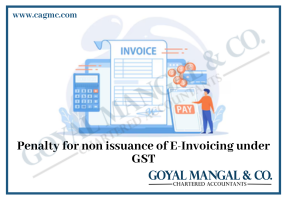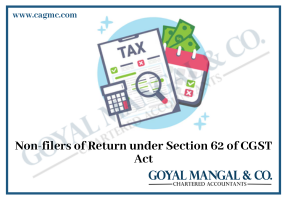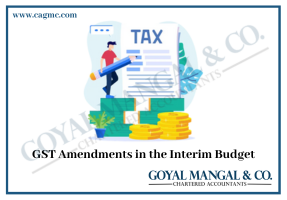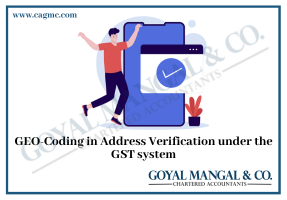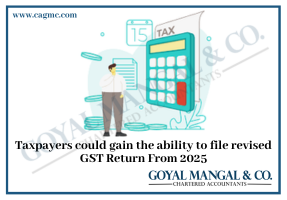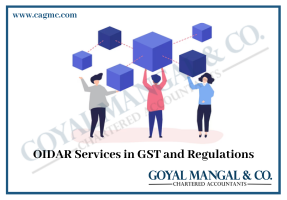
The implementation of the Goods and Services Tax (GST) in India has had a significant impact on various sectors, including the start-up ecosystem. With its implementation, GST has reshaped the way businesses operate, transforming the tax regime into a unified and simplified framework. This landmark tax reform has brought both challenges and opportunities for start-ups in Rajasthan, impacting their growth trajectories, market reach, and compliance processes. With the introduction of GST, start-ups in Rajasthan have experienced a significant positive impact. This transformative reform has, unlocked fresh opportunities, and created a thriving start-up ecosystem in the state known for its rich cultural heritage in the “Land of Kings.”
Introduction of GST in India
GST in India is a comprehensive indirect tax reform that simplifies the taxation system by subsuming multiple indirect taxes. The Goods and Services Tax (GST) is a comprehensive indirect tax reform introduced in India on July 1, 2017. It aimed to simplify the taxation system by subsuming multiple indirect taxes and unifying the market across states. While GST in India was implemented with the intention of fostering economic growth and ease of doing business, its impact on start-ups in various regions, including Rajasthan, has been a subject of analysis and discussion. This article delves into the implications of GST on start-ups in Rajasthan and examines how it has influenced their growth, challenges, and opportunities.
What is Start-Up and why it is popular business structure?
A start-up refers to a newly established business venture, typically characterized by innovation, scalability, and a potential for rapid growth. Start-ups are known for their dynamic and agile nature, as they are driven by entrepreneurial vision, experimentation, and the pursuit of scalable business models.
Start-ups have gained popularity as a business structure due to several reasons. Firstly, they offer the opportunity to create groundbreaking solutions and disrupt existing markets, attracting entrepreneurial individuals with a drive for innovation. Secondly, start-ups have the potential for significant growth and high returns on investment, which can be appealing to investors seeking opportunities for wealth creation. Thirdly, start-ups foster a culture of creativity, collaboration, and flexibility, providing an exciting and dynamic work environment for talented individuals. Overall, the popularity of start-ups can be attributed to their potential for disruptive innovation, high growth prospects, and the allure of a dynamic and rewarding entrepreneurial journey.
Registration Process for the Startup Registration in RajasthanTop of Form
The registration process for startup registration in Rajasthan involves the following steps:
- Determine Eligibility: Ensure that your business meets the eligibility criteria defined by the Rajasthan government. This typically includes being recognized as a startup by the Department for Promotion of Industry and Internal Trade (DPIIT) and having a unique business model with the potential for scalable and innovative solutions.
- Online Application: Visit the official Rajasthan Single Window Clearance System (SWCS) website and fill out the online application form for startup registration. Provide details about your business, such as name, address, nature of operations, founders, and other required information.
- Document for GST registration: The documents required for GST registration include proof of identity and address of the business owner, proof of business registration, bank account details, and authorized signatory documents. Additional documents may be required based on the type of business entity, such as partnership deed, memorandum of association, or articles of association. Upload the necessary documents along with the application form. These documents may include a business plan, proof of incorporation, identity proofs of founders, and any other supporting documents as per the requirements specified by the SWCS.
- Verification and Approval: The submitted application and documents will be reviewed by the concerned authorities. Upon successful verification, the startup registration certificate will be issued.
- Acknowledgement and Benefits: Once registered, you will receive an acknowledgment and a unique startup registration number. This registration provides access to various benefits and incentives offered by the Rajasthan government for startups, such as tax benefits, funding support, mentorship programs, and infrastructure facilities.
Impact of GST on Start-Up in Rajasthan
The following are the impact of GST on Start-Up in Rajasthan:
Ease of Compliance
One of the significant advantages of the Goods and Services Tax (GST) for start-ups in Rajasthan is the ease of compliance. Prior to the implementation of GST, start-ups had to navigate through a complex web of multiple indirect taxes, including Value Added Tax (VAT), service tax, and excise duty. Each tax had its own set of rules, regulations, and compliances, making the taxation process cumbersome and time-consuming for start-ups.
With the introduction of GST, the taxation system underwent a significant simplification. GST consolidated various taxes into a single tax regime, eliminating the need for start-ups to deal with multiple tax authorities and comply with diverse tax laws. This streamlined approach has significantly reduced the compliance burden on start-ups in Rajasthan.
Under GST, start-ups are required to file fewer returns compared to the previous tax regime. Earlier, start-ups had to file separate returns for different taxes on a monthly, quarterly, or yearly basis. This often led to confusion and increased paperwork. However, with GST, most start-ups are only required to file a monthly return, known as the GST Return, which covers both sales and purchases.
Moreover, the introduction of technology-driven platforms, such as the Goods and Services Tax Network (GSTN), has simplified the process of tax filing. Start-ups can now file their GST returns online, reducing manual errors and ensuring greater accuracy. The GSTN portal also provides various tools and services to assist start-ups in complying with the GST regulations, such as auto-population of data and reconciliation features.
Additionally, GST has introduced a uniform tax rate structure for goods and services, with specific rates assigned to different categories. This standardization has made tax calculations more straightforward for start-ups, as they no longer need to navigate through complex tax slabs and varying rates.
The ease of compliance offered by GST has allowed start-ups in Rajasthan to focus more on their core business activities and growth strategies. With reduced administrative burdens, start-up entrepreneurs can allocate their time and resources more efficiently, directing their efforts towards product development, marketing, and expanding their customer base.Top of Form
Increased Market Reach
GST has facilitated the creation of a common national market, eliminating inter-state barriers and reducing logistics complexities for start-ups in Rajasthan. The removal of entry barriers and state-specific taxes has enabled start-ups to expand their operations beyond their home state and cater to a broader customer base. This has resulted in increased market reach and access to a larger pool of potential consumers, stimulating growth and revenue generation for start-ups.
Input tax credit :
Input Tax Credit (ITC) is a mechanism that allows businesses to claim a credit for the taxes paid on their purchases, which can be offset against their tax liabilities. Here’s a simplified example to illustrate how ITC works.
Input tax credit example:
Let’s say ABC Pvt. Ltd. is a start-up in Rajasthan that manufactures and sells electronic goods. They purchase raw materials worth Rs. 1,00,000 from a GST-registered supplier, on which they pay GST of Rs. 18,000 (assuming a tax rate of 18%).
Now, when ABC Pvt. Ltd. sells the final product to a customer for Rs. 1,50,000, they charge GST at 18%, which amounts to Rs. 27,000.
To calculate the tax liability, ABC Pvt. Ltd. can deduct the input tax credit from their output tax liability. In this case, the input tax credit is Rs. 18,000.
So, the tax liability for ABC Pvt. Ltd. would be Rs. 27,000 (output tax) – Rs. 18,000 (input tax credit) = Rs. 9,000.
Therefore, ABC Pvt. Ltd. would need to pay Rs. 9,000 as GST to the government.
By claiming the input tax credit, ABC Pvt. Ltd. can reduce their overall tax liability and effectively lower their operational costs. This helps in optimizing working capital and making their products more competitively priced in the market.
Eligible and Ineligible Input Tax Credit
Eligible and ineligible Input Tax Credit (ITC) refers to the tax credits that businesses can claim for the taxes paid on their purchases. Eligible ITC includes taxes paid on inputs, raw materials, capital goods, and services used in the course of business. It allows businesses to offset their tax liabilities and reduce their overall tax burden. However, there are certain categories of expenses for which ITC is ineligible. This includes taxes paid on personal expenses, goods and services used for non-business purposes, goods and services that are exempt from GST, and certain specified goods and services disallowed under the GST laws. It is important for businesses to accurately determine the eligibility of ITC to comply with the GST regulations.
Input Tax Credit (ITC) Advantage
Here are six concise points highlighting the advantages of Input Tax Credit (ITC) for start-ups in Rajasthan:
- Cost savings: ITC allows start-ups to claim credit for the tax paid on their purchases. By reducing the overall tax liability, start-ups can lower their operational costs and increase profitability.
- Working capital optimization: With ITC, start-ups can free up their working capital by utilizing the tax credits to offset their output tax liability. This helps in better cash flow management and ensures funds are available for business growth.
- Competitive pricing: ITC enables start-ups to reduce their cost of production. This allows them to offer products or services at competitive prices, making them more attractive to customers in a highly competitive market.
- Incentive for tax compliance: The availability of ITC encourages start-ups to maintain proper tax compliance and engage with GST-registered suppliers. This creates a culture of compliance and fosters transparency in the business ecosystem.
- Encouragement for vendor selection: Start-ups prefer to engage with GST-compliant suppliers to ensure eligibility for claiming ITC. This promotes a trustworthy and compliant supply chain, reducing the risk of tax evasion and non-compliance.
- Boost to business expansion: ITC provides start-ups with the financial flexibility to invest in their growth and expansion plans. By reducing tax liabilities and enhancing cash flow, start-ups can allocate resources to areas such as marketing, research and development, or hiring skilled talent, thereby supporting business expansion.
- Increased Competition and Level Playing Field: GST has led to increased competition among businesses, as it has reduced the price advantage enjoyed by unorganized sectors and brought them on a level playing field with start-ups. The simplified tax structure and transparency in the GST system have encouraged more start-ups to enter the market, fostering innovation and creating a competitive business environment in Rajasthan. This has pushed start-ups to enhance their offerings, improve efficiency, and deliver better value to customers.
Challenges Faced by Start-ups
Here are five brief points highlighting the challenges faced by start-ups in Rajasthan:
- Compliance complexity: Start-ups in Rajasthan face challenges related to the complexity of GST compliance. Understanding and adhering to the various rules, regulations, and filing requirements can be daunting, especially for small businesses with limited resources and expertise.
- Resource constraints: Many start-ups in Rajasthan operate on tight budgets and have limited manpower. Compliance with GST necessitates dedicated resources for record-keeping, regular filing of returns, and managing invoicing. Allocating these resources while balancing other business priorities can be a challenge.
- Technology adoption: GST implementation requires start-ups to leverage technology for various processes, including tax filing, invoicing, and record-keeping. However, not all start-ups in Rajasthan may have the necessary technological infrastructure or knowledge to efficiently adapt to these digital requirements.
- Impact on cash flow: Start-ups may face cash flow challenges due to the timing difference between input tax credit (ITC) claims and the actual receipt of credit. Delays in ITC refunds can tie up working capital and hinder the financial stability and growth potential of start-ups.
- Classification and tax rate uncertainties: GST classification of products or services under specific tax slabs and the frequent changes in tax rates can create ambiguity for start-ups. Determining the correct tax rate applicable to their offerings and ensuring compliance can be a complex task, leading to potential cost implications and compliance challenges.Top of Form
Conclusion
Overall, the implementation of GST in Rajasthan has had a positive impact on start-ups. It has simplified the tax structure, reduced compliance burdens, expanded market opportunities, and leveled the playing field for businesses. Start-ups in Rajasthan have leveraged the benefits of GST to enhance their competitiveness, explore new markets, and drive innovation. With continued support and reforms, GST can be a catalyst for the success of start-ups and the overall economic development of Rajasthan.
